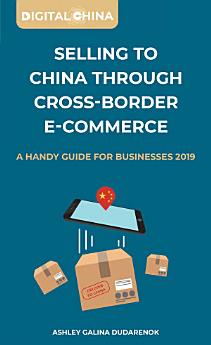Digital China: Selling to China Through Cross-Border E-Commerce: A Handy Guide for Businesses
About this ebook
This is an area that China is clearly prioritizing. If you’ve ever thought about expanding your business into China but hesitated, this is the book for you. There are plenty of cross-border e-commerce options available without having to set up a branch office or hire a large group of local staff. It’s a great solution for brands of all sizes.
Here’s an excerpt to give you a taste.
China is a huge market with great potential. It’s unique, sophisticated, hyper-competitive and it’s not easy to succeed. Despite the challenges, international brands of all kinds are eager to get access to over 1.4 billion Chinese consumers.
If you’ve decided that it’s time for your company to take its next big step and dive in, the good news is that it’s not necessary to set up shop in China to sell your products there. E-commerce is a way of life in China and by the end of 2019, e-commerce sales are forecast by some to expand 27.3%, reaching $1.935 trillion USD. This represents 36.6% of total retail sales in the country.
Cross-border e-commerce can blur geographical borders so we’ve created this mini-book to help marketers better understand major online sales channels for cross-border e-commerce in 2019. You’ll find out about key players to watch and major e-commerce shopping festivals. We’ll dive into information that will empower you to take action and make wise decisions when it comes to your marketing budget.
Social E-commerce and We-Commerce
Whether it’s traditional media opening their own online stores, or e-commerce sites adding more editorial content and social features, both sides are coming closer together in the form of social e-commerce. It’s happening everywhere but it’s a trend that’s even more advanced in China.
In the West, it’s more common to use an e-commerce site as the final stop when completing a transaction, whereas in China, e-commerce sites are destinations where you can make new discoveries, acquire information, socialize with others who can make informed recommendations and communicate with people who share your interests or concerns.
Social commerce has become very popular in China because customer acquisition costs have increased significantly on traditional platforms, like Alibaba and JD.com, so brands and platforms are looking for new ways to engage customers.
It’s estimated that by the end of 2022, 15% of all e-commerce in China will be social and it will became a major force in online retail sales.
As more e-commerce outlets start adding a social element to their business model, three general categories have emerged.
1. Content Sharing Platforms
The content sharing model is based on consumers trust in other consumers, influencers, key opinion leaders (KOLs) and key opinion consumers (KOCs). Brands and retailers cooperate with them to create content that informs potential buyers about their products and attempts to guide their purchasing decisions. KOLs and trusted consumers give products credibility and desirability.
KOCs are a role specific to China and WeChat. KOCs are personal accounts listed under someone’s name but they’re administered by brand employees and WeChat users are aware of this arrangement. These accounts publish information, content marketing and many also do a wide range of customer relationship management tasks such as handling complaints, making product orders, handling returns, issuing coupons, promoting sales and more. This role was developed as a workaround on the highly influential WeChat social media platform as it is built for person to person contact so this method is not only functional but also feels more personal and can deliver the immediate action that many Chinese consumers demand. It also enables a low cost ad network as advertising rates on WeChat are very high.
REVIEWS
“Ashley is truly professional with international perspective, yet down to earth.”
Bianca Un, Hang Lung Property
“Nobody knows Chinese Social Media like Ashley. I say this as an ex-competitor.”
Brad Emery CEO – Founder of The Aimviva Travel Club
About the author
Ashley Dudarenok is a serial entrepreneur, award-winning digital marketing professional and author. Recognised as a “guru on digital marketing and fast-evolving trends in China” by Thinkers50, Ashley is the founder China-focused digital marketing agency Alarice (www.alarice.com.hk) and China digital consultancy ChoZan 超赞(www.chozan.co). She has both a deep theoretical knowledge of China’s digital landscape development and is immersed daily in the market, observing and applying what works for business.
Her expertise has been sought after and endorsed by China’s tech giants, such as Alibaba, Jingdong, Pinduoduo and others. Ashley Dudarenok is serving the world’s most loved Fortune 500 brands, tech giants and unicorns to gain competitive advantage by applying tactics and strategies learned from the fast moving, innovative China market.
Ashley helps create a bridge between China and the rest of the world. She is an author of three international Amazon bestsellers and 6 mini books on Digital China.







